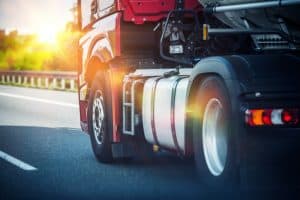Large Trucks Leveraging Technology and Slipstream to Save Energy Amid Concerns from Safety Advocates

Elite bicycle racers often engage in the practice of platooning, which involves following one another in a straight line at a close distance to reduce drag and increase efficiency. The practice of platooning is also used in the commercial trucking industry to save energy and increase safety.
Grouping two or more large trucks on the highway at what looks like an unsafe following distance can save on fuel costs, reduce greenhouse gas emissions, improve safety and take up less space on the road. These efficiencies can only be realized when the truck platoons function in an automated, coordinated way. This concept is not a vision for the future. Testing with platooning truck fleets is taking place right now to bridge the gap until fully autonomous trucks become a reality.
How does platooning actually work?
The company Peloton announced a U.S. Department of Energy-funded team to study how truck platooning can help save 20% on fuel costs for large trucks. By combining technologies such as radar, cameras, reflective light scanning and real-time vehicle to vehicle (V2V) communications, commercial trucks are digitally tethered. Platooning takes advantage of the lead truck's slipstream. The rear truck in a platoon can reduce fuel use by 10% or more because the lead truck is drastically reducing wind drag. In platooning, the lead truck also experiences reduced fuel use because the rear truck, which is following closely behind, eliminates a lot of turbulence. This allows the two vehicles move almost as one with the wind traveling over both vehicles almost uninterrupted. Because the vehicles are in constant communication with one another in real time, if the lead truck applies the brakes, the rear truck's brakes are applied simultaneously and in half the time it takes for the human driver to realize that there is a hazard ahead and then apply the brakes.
Will platooning lead to increased safety on the road?
The technology that makes platooning possible might also make trucks safer. The platooning operation is monitored by a remote data center that tracks weather conditions, road and traffic conditions and only engages platooning when conditions are ideal. Peloton has an explainer video on their website which shows how platooning works. Another company, Volpe Technologies, is working with the Federal Highway Administration to develop baseline statistics to determine the optimum following distances for automated truck platoons.
In September 2017, the Federal Highway Administration (FHWA) and Federal Motor Carrier Safety Administration (FMCSA) hosted a demonstration of truck platooning technologies in the I-66 corridor in Centreville, VA. The trucks demonstrated platooning using Cooperative Adaptive Cruise Control (CACC) System technology. The FMCSA also demonstrated their new truck inspection technologies and safety screening tools designed to make commercial trucking safer and more efficient.
A story in Trucks.com reports that there are nine states with regulations that allow platooning and more states are expected to follow. Another 29 states may allow platooning under current laws regarding following distance laws, and one state, Missouri, has banned the testing of platooning on its state highways due to safety concerns.
There are still many technical hurdles to cross, and then there is the issue of how the general driving public will be informed about interacting with platooning trucks and then eventually, autonomous trucks on the highway. Liability issues are another concern in the event of a technology glitch which allows the following truck to crash into the lead truck.
Commercial truck safety is important, but even the best laid plans can go awry. At Gainsberg Injury and Accident Lawyers, we help victims of truck accidents in Chicago and throughout the state. To learn more about our services, or to schedule a free consultation with an experienced lawyer, please call 312-600-9585 or fill out our contact form .

Attorney Neal Gainsberg has spent the last 20+ years fighting to protect the rights of the injured in Chicago and throughout Illinois. For dedicated legal help with a personal injury, car accident, or wrongful death matter, contact Gainsberg Injury and Accident Lawyers in Chicago for a free consultation.
